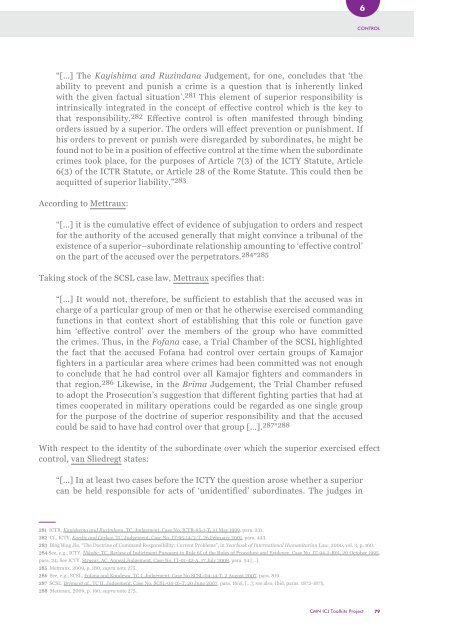Command Responsibility
CMN_ICL_Guidelines_Command_Responsibility_En
CMN_ICL_Guidelines_Command_Responsibility_En
You also want an ePaper? Increase the reach of your titles
YUMPU automatically turns print PDFs into web optimized ePapers that Google loves.
6<br />
CONTROL<br />
“[…] The Kayishima and Ruzindana Judgement, for one, concludes that ‘the<br />
ability to prevent and punish a crime is a question that is inherently linked<br />
with the given factual situation’. 281 This element of superior responsibility is<br />
intrinsically integrated in the concept of effective control which is the key to<br />
that responsibility. 282 Effective control is often manifested through binding<br />
orders issued by a superior. The orders will effect prevention or punishment. If<br />
his orders to prevent or punish were disregarded by subordinates, he might be<br />
found not to be in a position of effective control at the time when the subordinate<br />
crimes took place, for the purposes of Article 7(3) of the ICTY Statute, Article<br />
6(3) of the ICTR Statute, or Article 28 of the Rome Statute. This could then be<br />
acquitted of superior liability.” 283<br />
According to Mettraux:<br />
“[…] it is the cumulative effect of evidence of subjugation to orders and respect<br />
for the authority of the accused generally that might convince a tribunal of the<br />
existence of a superior–subordinate relationship amounting to ‘effective control’<br />
on the part of the accused over the perpetrators. 284 ” 285<br />
Taking stock of the SCSL case law, Mettraux specifies that:<br />
“[…] It would not, therefore, be sufficient to establish that the accused was in<br />
charge of a particular group of men or that he otherwise exercised commanding<br />
functions in that context short of establishing that this role or function gave<br />
him ‘effective control’ over the members of the group who have committed<br />
the crimes. Thus, in the Fofana case, a Trial Chamber of the SCSL highlighted<br />
the fact that the accused Fofana had control over certain groups of Kamajor<br />
fighters in a particular area where crimes had been committed was not enough<br />
to conclude that he had control over all Kamajor fighters and commanders in<br />
that region. 286 Likewise, in the Brima Judgement, the Trial Chamber refused<br />
to adopt the Prosecution’s suggestion that different fighting parties that had at<br />
times cooperated in military operations could be regarded as one single group<br />
for the purpose of the doctrine of superior responsibility and that the accused<br />
could be said to have had control over that group […]. 287 ” 288<br />
With respect to the identity of the subordinate over which the superior exercised effect<br />
control, van Sliedregt states:<br />
“[…] In at least two cases before the ICTY the question arose whether a superior<br />
can be held responsible for acts of ‘unidentified’ subordinates. The judges in<br />
281 ICTR, Kayishema and Ruzindana, TC, Judgement, Case No. ICTR-95-1-T, 21 May 1999, para. 231.<br />
282 Cf., ICTY, Kordic and Cerkez, TC, Judgement, Case No. IT-95-14/2-T, 26 February 2001, para. 443.<br />
283 Bing Bing Jia, “The Doctrine of <strong>Command</strong> <strong>Responsibility</strong>: Current Problems”, in Yearbook of International Humanitarian Law, 2000, vol. 3, p. 160.<br />
284 See, e.g., ICTY, Nikolic, TC, Review of Indictment Pursuant to Rule 61 of the Rules of Procedure and Evidence, Case No. IT-94-2-R61, 20 October 1995,<br />
para. 24; See ICTY, Strugar, AC, Appeal Judgement, Case No. IT-01-42-A, 17 July 2008, para. 54 […].<br />
285 Mettraux, 2009, p. 180, supra note 275.<br />
286 See, e.g., SCSL, Fofana and Kondewa, TC I, Judgement, Case No.SCSL-04-14-T, 2 August 2007, para. 819.<br />
287 SCSL, Brima et al., TC II, Judgement, Case No. SCSL-04-16-T, 20 June 2007, para. 1655, […]; see also, Ibid, paras. 1872-1875.<br />
288 Mettraux, 2009, p. 160, supra note 275.<br />
CMN ICJ Toolkits Project<br />
79


